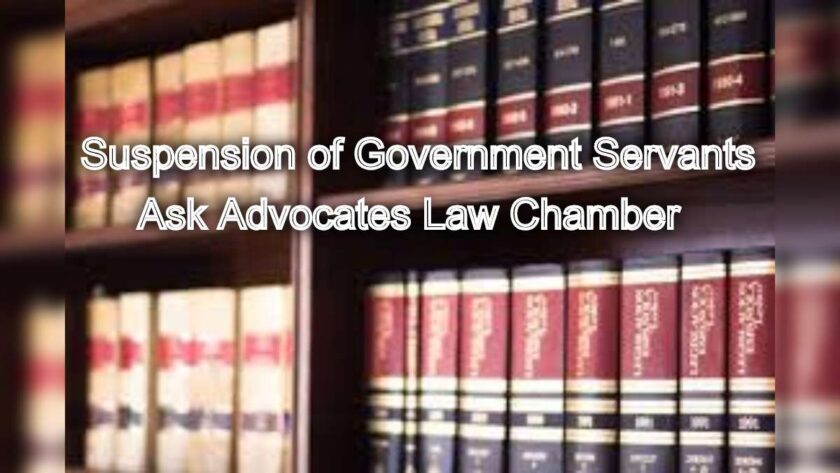Suspension of Government Servants: A suspension from government service is a serious and distressing event. It is not a punishment in itself. Instead, it is a preventive measure. The purpose is to ensure a fair and impartial inquiry. It also prevents the employee from influencing an investigation. However, suspension orders are sometimes issued arbitrarily. They can be prolonged indefinitely. This causes immense professional and personal hardship. In such situations, government servants have a right to legal recourse. The Central Administrative Tribunal (CAT) is the forum for these disputes. Ask Advocates Law Chamber, with its reputation as a global force in legal defense, offers unparalleled expertise in this area. We help clients challenge unjust suspension orders. This article, consequently, details the effective strategies we employ at the CAT.
Navigating a Crisis: Expert Strategies for Suspending Government Servants
The Legal Foundation of Suspension
First, one must understand the legal basis for suspension. Rule 10 of the Central Civil Services (Classification, Control and Appeal) Rules, 1965 (CCS (CCA) Rules) governs suspension for central government employees. These rules specify the conditions under which a government servant can be suspended. This includes situations where disciplinary proceedings are pending or contemplated. A suspension can also occur if a criminal case is under investigation or trial. Additionally, if an employee is detained in custody for more than 48 hours, they are deemed suspended. Therefore, a suspension order must be based on a clear legal ground. We, therefore, scrutinize the suspension order. We check if it adheres to these legal provisions.
The Ground Reality: Challenging the Suspension Order
A suspension order can be challenged on several grounds. We meticulously analyze the specific facts of each case. We look for any procedural irregularities. The order must be a preventive, not punitive, measure. If the suspension is used to harass or punish the employee without proper inquiry, we challenge its legality. Furthermore, the suspension must be reviewed periodically. The Supreme Court in the landmark case of Ajay Kumar Choudhary v. Union of India held that a suspension should not extend beyond three months if a charge sheet has not been issued. Subsequent reviews are also mandatory every 180 days. A failure to conduct these reviews makes the suspension order vulnerable to being quashed. We, therefore, track these deadlines. We file applications to have the suspension revoked if these rules are not followed.
The Process at the Central Administrative Tribunal (CAT)
The Central Administrative Tribunal (CAT) is a specialized quasi-judicial body. It adjudicates disputes related to the service conditions of government employees. Filing an Original Application (OA) at the CAT is the first step. Our legal team drafts this application with extreme care. The application outlines the facts of the case. It specifies the legal grounds for challenging the suspension. It also prays for the relief sought, such as revocation of the suspension order. We collect all relevant documents. This includes the suspension order, any correspondence with the department, and service records. This thorough preparation is crucial for a strong case.
Building a Strong Defense: Our Key Strategies
Our strategies at the CAT are multi-pronged. Firstly, we focus on procedural lapses. We argue that the suspension order was passed by an incompetent authority. We may also show that the order was passed without application of mind. Secondly, we focus on the principle of proportionality. A prolonged or indefinite suspension without a timely inquiry is arbitrary. It is also a violation of the principles of natural justice. We, therefore, argue that the suspension has lost its purpose. It has become a punishment in itself. We cite precedents from the Supreme Court and various High Courts. This strengthens our legal arguments. Finally, we highlight the prejudice caused to our client. This includes financial hardship due to a reduced subsistence allowance.
The Role of Subsistence Allowance
During suspension, a government servant is entitled to a subsistence allowance. This is typically 50% of the basic pay and allowances for the first 90 days. It can be increased to 75% if the delay in proceedings is not attributable to the employee. A delay in the payment of this allowance can also be a ground for legal action. It violates the employee’s fundamental right to life and dignity. We ensure that our clients receive this allowance on time. We take legal action if there is any delay. This provides some financial relief during a difficult period.
The Outcome: Reinstatement and Back Wages
If our petition is successful, the CAT may quash the suspension order. The government servant is then reinstated. The period of suspension is treated as a period spent on duty. The employee, consequently, becomes entitled to full pay and allowances for the entire suspension period. This is a significant victory. Our objective is not just to revoke the suspension. We also aim to secure full compensation. Fight for our clients’ rights and their professional reputation. We do not rest until justice is served.
Frequently Asked Questions
A government servant’s suspension is primarily governed by Rule 10 of the Central Civil Services (Classification, Control and Appeal) Rules, 1965 (CCS (CCA) Rules). It is a preventive measure, not a punishment.
Yes, an indefinite or prolonged suspension can be challenged. The Supreme Court of India, in the landmark case of Ajay Kumar Choudhary v. Union of India, held that a suspension should not extend beyond three months if a charge sheet is not issued. Furthermore, a suspension order must be reviewed periodically, typically every 90 days.
The process involves filing an Original Application (OA) at the Central Administrative Tribunal. The application must detail the facts of the case, the legal grounds for the challenge, and the relief sought, such as the revocation of the suspension order. You will need to submit all relevant documents, including the suspension order and any related correspondence.
A subsistence allowance is a monetary benefit paid to a government servant during the period of their suspension. Under the CCS (CCA) Rules, it is typically 50% of the basic pay and allowances for the first 90 days.
If the Central Administrative Tribunal quashes a suspension order, the government servant is reinstated to their position. The period of suspension is then treated as a period spent on duty. Consequently, the employee is entitled to receive the full pay and allowances for the entire suspension period.
Conclusion
In conclusion, a suspension order can be a devastating experience for a government servant. However, it is not an insurmountable obstacle. With the right legal strategy and a knowledgeable legal team, you can challenge an unjust suspension. Ask Advocates Law Chamber has a deep understanding of service law. We have extensive experience at the Central Administrative Tribunal. We use this expertise to build powerful defense strategies. Are committed to protecting the rights of government servants. We are your best global force in legal defense. We will fight to ensure that your suspension is not used as a tool of harassment. Will work tirelessly to get you back to work with your head held high.
Read More
- How NGT is Shaping Chennai’s Lakes, Marshlands, and Coastal Projects
- What to Do When a Bank Files a Case in DRT? Your Legal Options
- Director Disqualification under Section 164 of Companies Act: NCLT Remedies
- Customs Tariff Rate Conflicts with Authorities? Legal Steps You Can Take Now
- Avoid Penalties: Legal Solutions for Customs Tariff Disputes in India
- Central Administrative Tribunal (CAT):



